Essential oils for swollen lymph nodes:
Introduction
The lymphatic system is a network of vessels, organs, and lymph nodes situated throughout the human body.
Lymph nodes are clusters of cells, surrounded by a capsule.
The lymph nodes play an important role in the body’s capacity to fight off infections.
They are actually glands that store white blood cells – cells of the immune system that move throughout the body, looking for invaders.
A lymph node is considered swollen if it measures approximately half an inch wide.
Common areas where swollen lymph nodes are more prominent include:
- in the armpits;
- under the chin;
- the groin;
- in the neck;
- behind the ear.
A few mechanisms can cause the lymph nodes to enlarge, such as:
Cancer
- cancer of the blood – malignant multiplication of lymphocytes as in leukemia or lymphoma;
- skin cancers – they may spread first to the closest lymph glands to the area of skin involved;
- stomach and lung cancers – they may spread to lymph glands which you typically cannot see or feel in the abdomen and chest;
- throat cancer – it may spread to lymph glands in the neck;
- breast cancer – it may spread to the lymph glands in the armpit.
Inflammation
Infiltration with inflammatory cells during inflammation in a region of a given lymph node.
Virus
There is an immune reaction to a generalized infection in the human body, like viral infections, which can occur with the common cold as well as with HIV.
Infection
Numerous types of infection can cause swollen glands, like a glandular fever or a cold.
This can increase the number of white blood cells, that multiply in response to stimulation with a foreign substance.
Treatment
You can help to ease the symptoms by:
- taking painkillers like ibuprofen or paracetamol;
- reducing your stress levels;
- spending time outside to boost vitamin D levels;
- drinking plenty of fluids;
- having a diet rich in fruits and vegetables;
- avoiding alcohol and tobacco;
- plenty of rest.
15 Essential Oils For Swollen Lymph Nodes Behind Ear, In Armpit, Neck, Throat, and Groin:
1) Tea Tree
It is derived from the leaves of a native plant to the Northeast Coast and Southeast Queensland with the scientific name of Melaleuca alternifolia.
Tea tree oil has potent antiseptic properties, meaning that it can inhibit the growth of harmful bacteria.
Note – when applied topically, it may prevent skin infections and reduce swollen lymph nodes.
People also use tea tree essential oil for the following conditions:
- yeast infection;
- acne;
- eczema;
- athlete’s foot;
- psoriasis;
- fungal infection of the toenails;
- lice;
- dandruff;
- ringworm;
- blackheads;
- skin tags;
- cystic acne;
- boils;
- vaginitis;
- as an antiseptic;
- periodontal disease;
- thrush.
How to use it:
Topical Application: Mix a few drops of tea tree essential oil with a carrier oil like coconut or jojoba oil. Apply this blend gently on the swollen lymph nodes behind the ear, in the armpit, neck, throat, and groin. Remember to massage softly, as vigorous rubbing could cause discomfort.
Steam Inhalation: Add a few drops of tea tree oil to a bowl of hot water. Cover your head with a towel and inhale the steam. This method could be beneficial, especially for swollen lymph nodes in the throat and neck area.
In a Bath: Adding a few drops of tea tree oil to your bath water can also be beneficial. Soak in the bath for at least 15-20 minutes.
2) Myrrh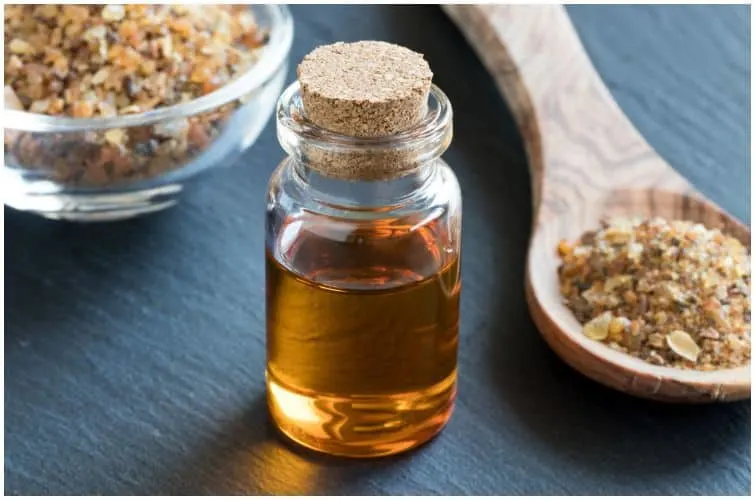
It is a type of essential oil that has long been used in aromatherapy and is made from the gum of the Commiphora myrrha tree.
This oil has antimicrobial, antifungal, antibacterial, and anti-parasitic attributes.
Also, this essential oil boosts the immune system, fights the aging process with antioxidants, and has been proven to help fight cancer.
How to use it:
Dilute a few drops of myrrh essential oil with a carrier oil such as coconut or jojoba oil to avoid skin irritation. Apply this blend gently on the swollen lymph nodes.
3) Bay Laurel
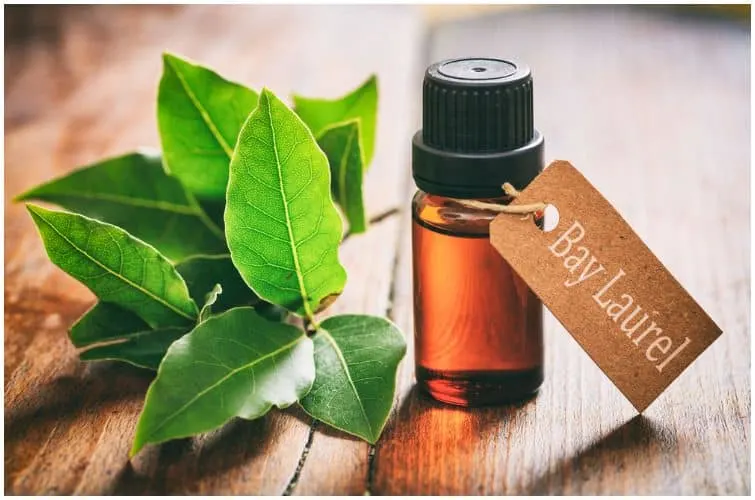
rawf8/Shutterstock
This popular essential oil is revered for its capacity to ease arthritis and rheumatism.
Furthermore, it is used in aromatherapy as a treatment for earaches and hypertension.
The benefits of bay laurel oil also include relief of the symptoms stemming from colds, flu, amenorrhea, tonsillitis, swollen lymph nodes, and lack of appetite.
How to use it:
You can use Bay Laurel essential oil in a diffuser or steam inhalation method. Inhaling the aroma can stimulate the lymphatic system and help reduce swelling.
4) Fennel
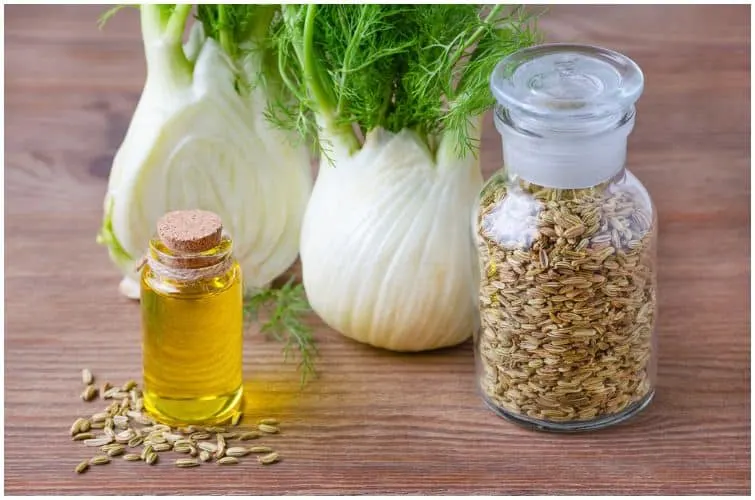
nadisja/Shutterstock
Fennel seed essential oil is steam distilled from the seeds of the Foeniculum vulgare.
It has a distinct flavor and is a good source of magnesium, potassium, calcium, and vitamin C.
Fennel was used in various ancient civilizations — by the Chinese as a remedy for snake bites and by the Egyptians for food and medicine.
This essential oil is commonly used to encourage mental clarity and greater self-expression.
It also has anti-fungal, antimicrobial, analgesic, anti-diabetic, antiseptic, antioxidant, antispasmodic, aperient, carminative, anti-toxic, depurative, emmenagogue, estrogenic, digestive, diuretic, galactagogue, splenic, stimulant stomachic, expectorant, and vermifuge therapeutic properties.
How to use it:
Dilute a few drops of fennel essential oil with a carrier oil like coconut or almond oil to avoid skin irritation. Apply this blend gently on the affected area, massaging softly.
5) Oregano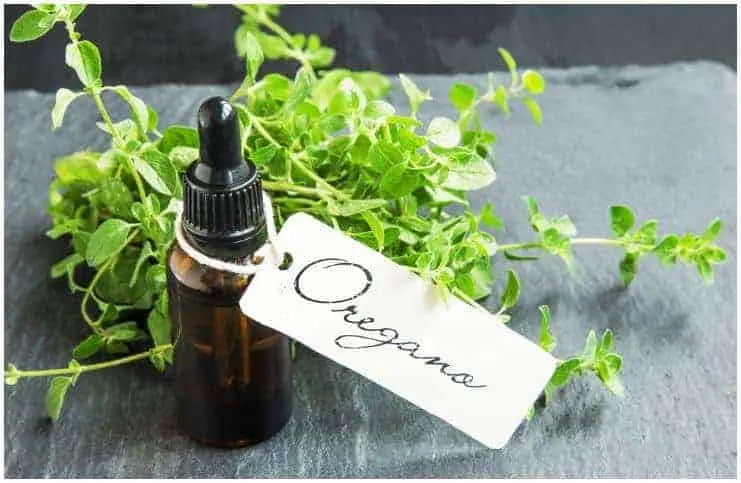
Oregano essential oil comes from the oregano plant, which is native to areas of the Mediterranean and western Asia and is a member of the mint family.
When diffused, it can improve the efficiency of the respiratory tract, boost the immune system, and invigorate the mind and body.
This essential oil has shown anti-inflammatory, tissue remodeling, anti-cancer, and immunomodulatory attributes, that make oregano a great essential oil for the skin when used correctly.
Moreover, recent research has concluded that oregano essential oil is a strong natural antibiotic, superior to chemical antibiotics, as it has no adverse effects.
How to use it:
Add a few drops of oregano essential oil to hot water, soak a clean cloth in it, and apply it to the swollen area.
6) Mandarin
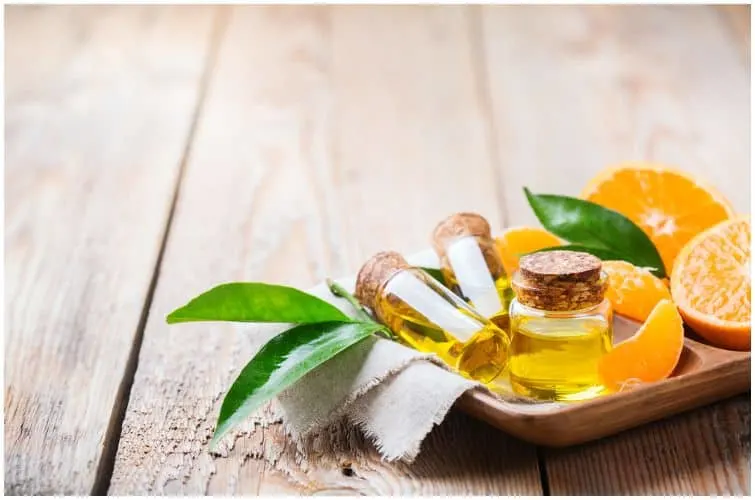
Antonina Vlasova/Shutterstock
Mandarin essential oil is sweet, mild, and calming.
The health benefits of mandarin oil can be attributed to its properties as an antispasmodic, antiseptic, circulatory, depurative, cytophylactic, digestive, hepatic, sedative, stomachic, nervous relaxant, and tonic substance.
It has the capacity to help prevent infection of the irritated skin by preventing fungal and bacteria development.
Plus, it may be able to help with stretch marks, acne, and scars.
How to use it:
Inhaling the aroma can stimulate the immune system, which could help reduce swelling.
7) Carrot Seed
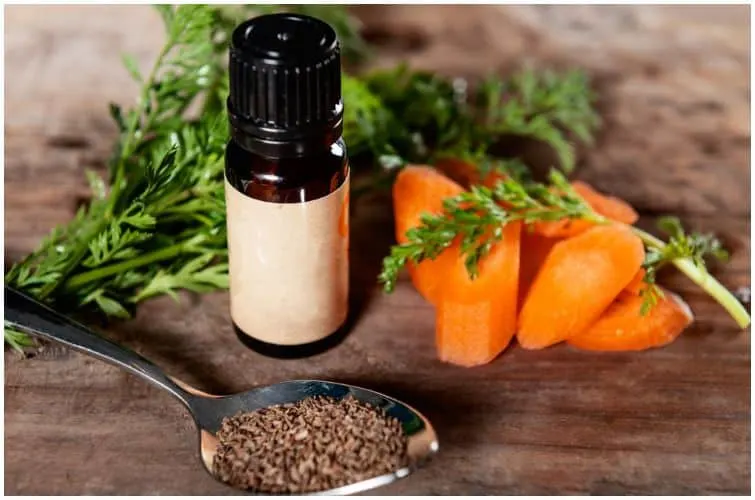
Anna Mente/Shutterstock
It is produced by steam distillation, mainly from the dried seeds of wild carrots.
Among its more popular uses, this essential oil can be applied topically for skin problems.
Also, it has powerful antibacterial properties.
How to use it:
Add a few drops of carrot seed essential oil to hot water, soak a clean cloth into it, and apply it to the swollen area.
8) Juniper Berry
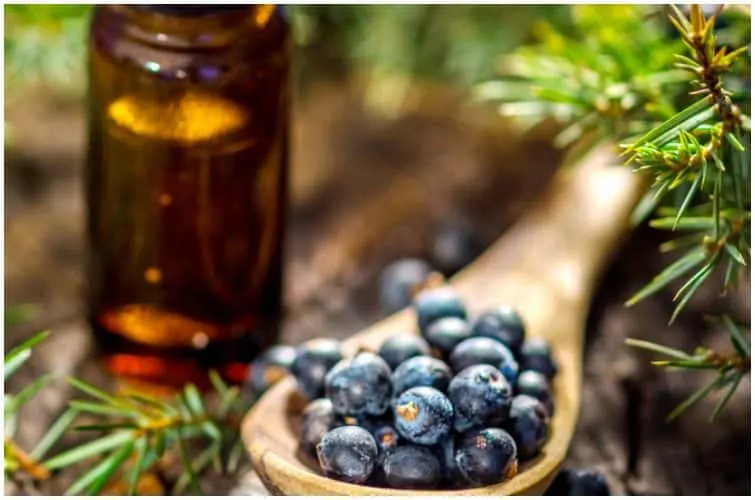
Dani Vincek/Shutterstock
This essential oil generally comes from the dried or fresh berries and needles of the Juniperus communis plant species.
It is used as a natural detoxification agent. Furthermore, it aids digestion, boosts the immune system, and soothes muscles.
How to use it:
Add 10-15 drops of juniper berry essential oil to a warm bath and soak for at least 20 minutes. This can help increase circulation and promote healing.
9) Ginger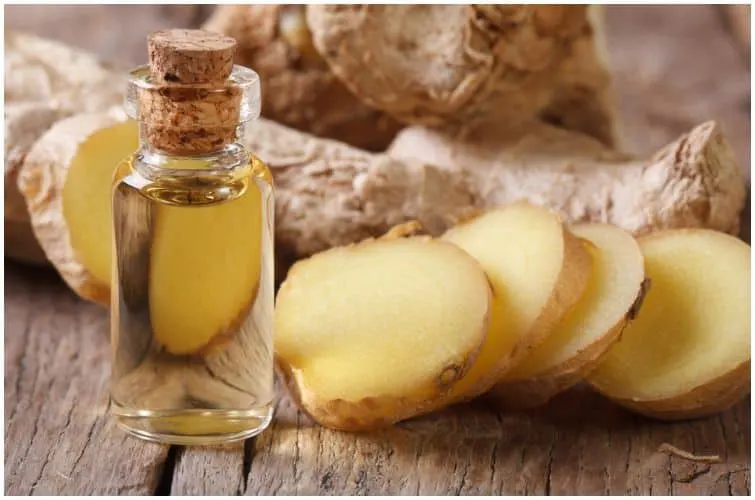
This essential oil has been around for hundreds of years and was widely used as an important component in ancient Ayurvedic medicine.
The health benefits of ginger oil are primarily attributed to its anti-inflammatory, analgesic, antiseptic, carminative, digestive, aphrodisiac, expectorant, and stimulating attributes.
How to use it:
Combine ginger essential oil with other beneficial oils such as lavender or lemon and a carrier oil. Use this blend for a soothing massage to stimulate lymph drainage.
ALSO READ: Side Effects of Donating Plasma
10) Lemon
Like most other essential oils manufactured from citrus fruits, lemon oil is cold-pressed from the rinds of the lemon fruit.
It is a source of many therapeutic properties that include the following:
- potential anti-cancer effect;
- tonic;
- hypotensive;
- insecticidal;
- diuretic;
- antimicrobial;
- anti-sclerotic;
- anti-rheumatic;
- antiseptic.
How to use it:
Add several drops of lemon essential oil to a diffuser. The aroma can stimulate the lymphatic system and help reduce swelling.
READ MORE: Interesting Facts About E. Coli
11) Peppermint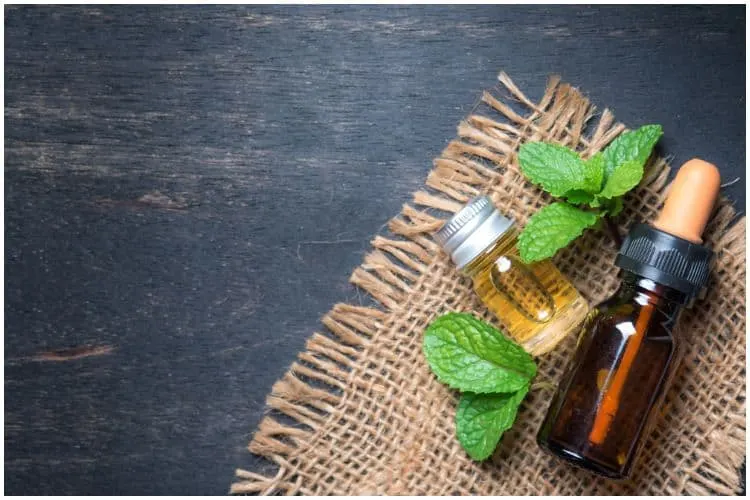
This essential oil is steam-distilled from the stems and leaves of the peppermint plant.
Some of the therapeutic properties of this essential oil include – anesthetic, antiseptic, analgesic, antispasmodic, astringent, antiphlogistic, cephalic, carminative, cordial, emmenagogue, expectorant, decongestant, hepatic, febrifuge, stimulant, stomachic, nervine, vasoconstrictor, sudorific, and vermifuge.
The clinical evidence established that peppermint essential oil can help with indigestion and prevent spasms in the gastrointestinal tract caused by endoscopy or barium enema. In addition, it helps with the symptoms of IBS.
How to use it:
Incorporate 10 drops of peppermint essential oil into a warm bath. Soaking in this can help increase circulation and reduce inflammation.
READ MORE: Reasons For Weight Gain After Surgery
12) Cypress
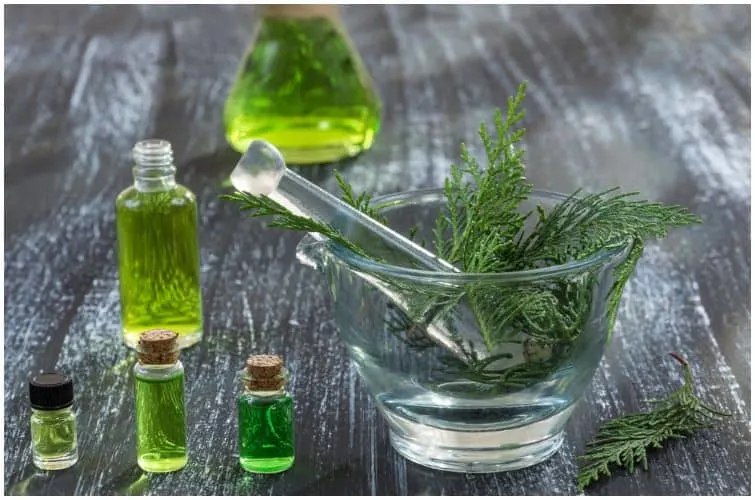
JPC-PROD/Shutterstock
Cypress essential oil is extracted through steam from the bark of the tree.
It has a mild sedative effect, which can relax both the mind and the body. It also contains camphene, a naturally occurring antiseptic.
How to use it:
Combine Cypress essential oil with other essential oils like grapefruit and a carrier oil. Use this blend for a gentle lymphatic massage, always massaging towards the heart.
READ MORE: Yeast Infection vs Chlamydia
13) Grapefruit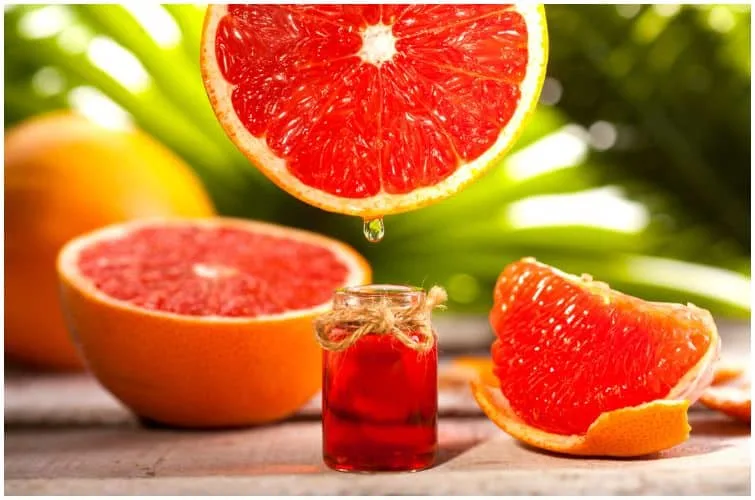
Grapefruit essential oil contains various phytochemicals and is known for its antimicrobial, antifungal, anticarcinogenic, antioxidant, antiseptic, stimulant, diuretic, and tonic properties.
The oil acts by stimulating the endocrine glands and by regulating the proper secretion of the body’s natural enzymes.
How to use it:
Create a blend using 4 drops of cypress essential oil, 2 drops of grapefruit essential oil, and 2 drops of orange essential oil. Dilute this blend in a carrier oil and massage onto the swollen area.
READ MORE: Causes for redness around the nose
14) Wintergreen
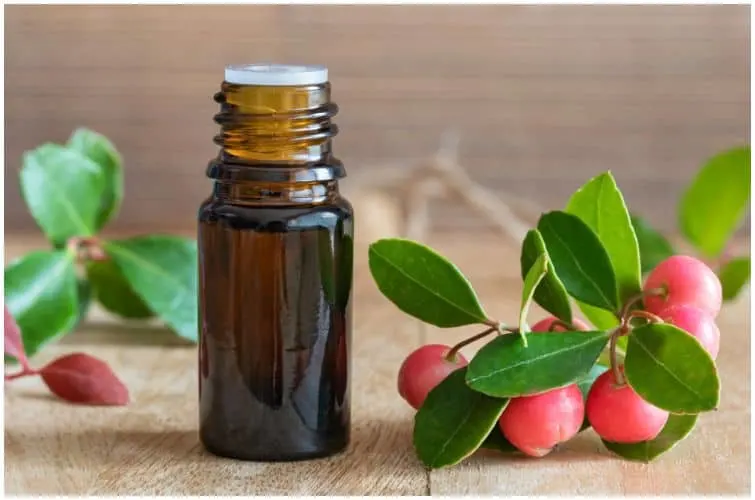
Madeleine Steinbach/Shutterstock
It is steam distilled from the leaves of the wintergreen shrub.
This essential oil is used in balms to relieve discomfort associated with muscle and joint pain. The active ingredient in wintergreen essential oil is methyl salicylate.
How to use it:
Add a few drops of wintergreen essential oil to a bowl of warm water. Dip a clean cloth into the mixture, wring out the excess water, and place it on the swollen area.
READ MORE: Right Atrial Enlargement
15) Frankincense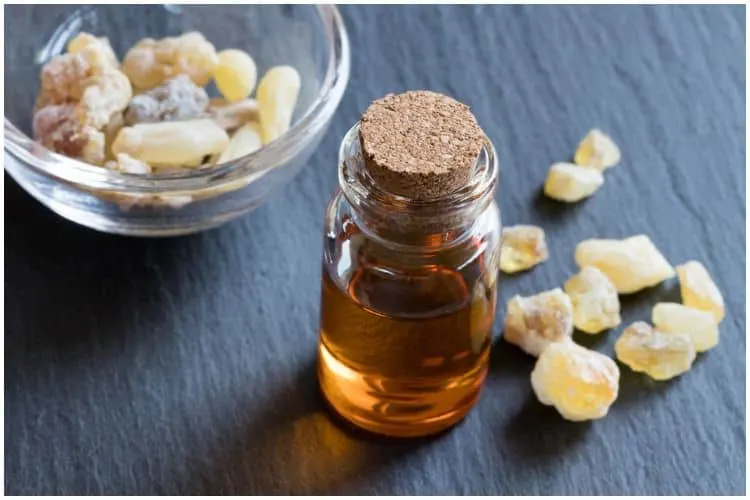
Frankincense essential oil may inhibit the growth of cancer cells, according to a 2010 study which was published in the Journal of Molecular Pharmacology.
Moreover, it has been shown to reduce skin irritation like sores, as per research published in the Journal of Medicinal Plants.
How to use it:
Diffuse a few drops of frankincense essential oil in your room. The aroma can help stimulate the lymphatic system and reduce swelling.
READ THIS NEXT: Essential Oils For Enlarged Prostate
Sources https://study.com/academy/lesson/lymph-nodes-anatomy-location-quiz.html https://www.cancer.gov/staging/sentinel-node-biopsy-fact-sheet https://jamanetwork.com/journals/jamaoncology/fullarticle/2522372 https://www.sciencedaily.com/releases/2015/04/150427082849.htm

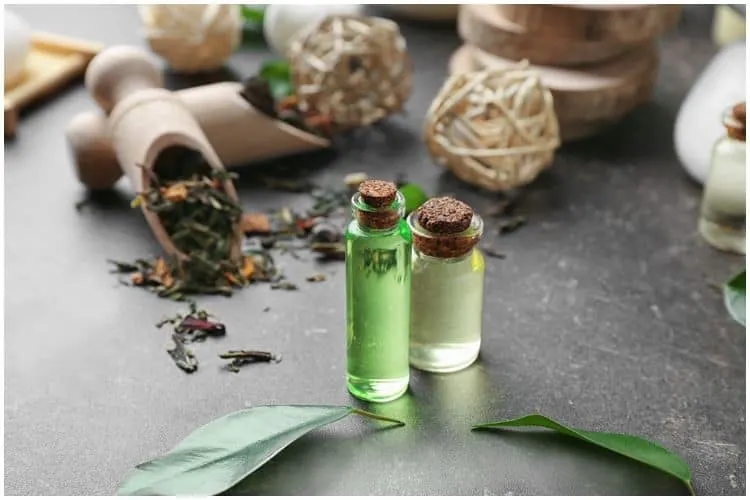
MaryBlackmon
Thursday 21st of December 2023
Thank you,I will try the oils
Sheri
Sunday 26th of November 2023
Great list to keep handy! I craft my own organic Calendula Infused Olive Oil, and I personally would use that as the carrier oil for the additional benefits that both olive oil and calendula have. ❤
Fikile Ngcobo
Tuesday 12th of September 2023
My son recently diagnosed with kaposi sarcoma and has developed a lot of swollen lymph nodes.
Fikile Ngcobo
Tuesday 12th of September 2023
Good day, need to know if all these oils can be taken orally or they are only for external use if yes how do we take them in terms of doses
Marlena
Friday 17th of February 2023
Goodmorning. It’s good, to know sam information about the oils which they working in swollen lymph .